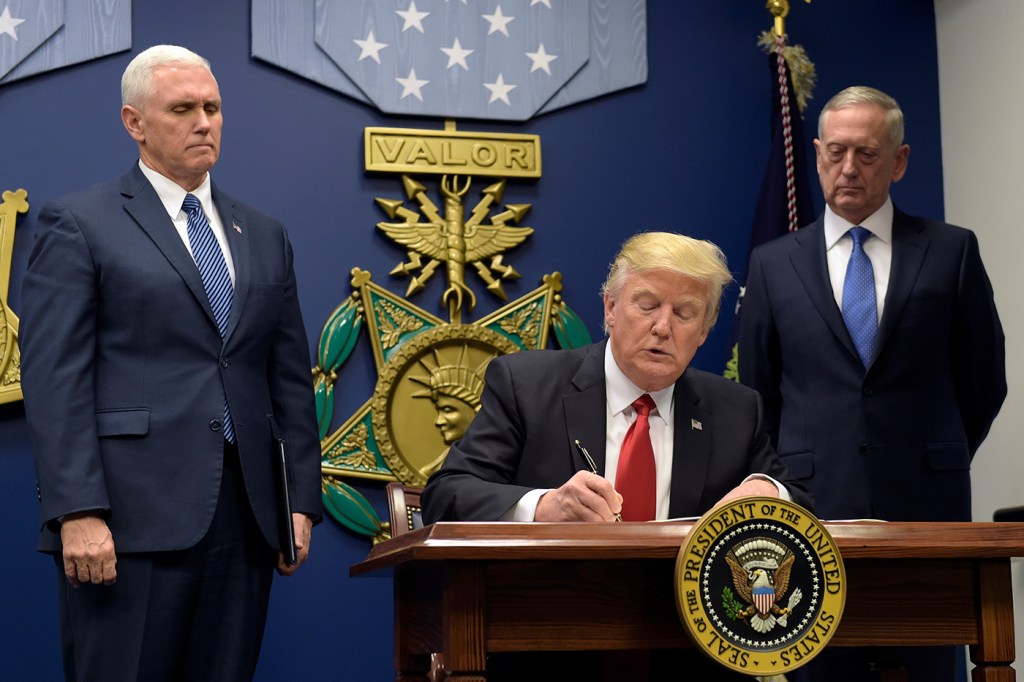Expert examines Trump’s immigration policies

President Donald Trump signed an executive order on Friday to block all refugees from entering the U.S. for at least 120 days. The order also halts immigration for 90 days from seven predominately Muslim countries—Iran, Iraq, Libya, Somalia, Sudan, Syria, and Yemen—while the government reviews its vetting procedures.
“We want to ensure that we are not admitting into our country the very threats our soldiers are fighting overseas,” Trump said during the signing at the Pentagon. “We only want to admit those into our country who will support our country and love deeply our people.”
The American Civil Liberties Union condemned the order, calling it a “euphemism for discrimination against Muslims,” and brought a challenge on behalf of two Iraqis detained at John F. Kennedy airport in New York on Friday night. Over the next 36 hours, U.S. federal judges in Boston and New York ruled that authorities could not deport citizens of the seven majority-Muslim countries who had already arrived in the U.S. with valid visas, or who were in transit.
In response, Reince Priebus, the White House chief of staff, said on Sunday that people from the affected countries who hold green cards will not be prevented from returning to the U.S., adding a layer of confusion to Trump’s executive order.
We asked Northeastern law professor Rachel Rosenbloom, an immigration policy expert, to weigh in on Trump’s plan to keep “radical Islamic terrorists” out of the United States and its potential effects on refugees worldwide.
The U.S. has long been known as a haven for people fleeing war and oppression. How might that opinion change if the country begins to ban refugees from entering the country, particularly if it appears as though they are being denied entrance due to their race or religion?
The United States has not always been known as a haven for people fleeing war and oppression. In fact, many Jewish refugees fleeing Hitler, including Anne Frank, were denied visas to the United States and later perished in Nazi concentration camps. President Roosevelt’s decision in 1939 to turn away a boat filled with Jewish refugees—the St. Louis—was a pivotal event in our history and led, after the war, to the passage of the first U.S. laws aimed at facilitating the admission of refugees. The policies that President Trump has just announced will go down in the history books as a moral failing of the same magnitude.
Matthew La Corte, an immigration policy analyst at a public policy think tank, noted that “pulling the U.S. out of its traditional leadership role in resettlement makes it harder to justify refugee resettlement as a good policy for other countries as well.” What effect do you think Trump’s immigration policies might have on the fate of refugees worldwide?
The truth is that there are other countries that take in far more refugees than the United States. Turkey, Pakistan, and Lebanon, for example, are currently housing millions of refugees. However, the U.S. refugee resettlement program has been a model for similar programs in Europe and elsewhere, and Trump’s decision to suspend the program temporarily, and then to reduce its size and stop admitting Syrian refugees entirely, will have troubling ripple effects around the globe.
Some potential immigrants say that Trump’s executive order to ban them from entering the U.S. has destroyed their dreams of moving to this country in search of a better life. What practical implications might Trump’s refugee ban have on the hundreds of thousands of people whose lives are likely to be affected?
This order will have direct, immediate effects on many people, most obviously on those who are citizens of Iran, Iraq, Libya, Somalia, Sudan, Syria, and Yemen and also on many others—including many U.S. citizens—who are their family members, co-workers, and friends. Draconian immigration laws affect entire communities, not just individuals. It is important to understand that this ban applies not only to new visa applicants but also those who have been living and studying in the United States for years. You would have to go back to the shameful history of the Chinese Exclusion Act and the Asiatic Barred Zone to find such an openly discriminatory policy. Several federal judges have already blocked implementation of the order, and we will see a lot more litigation in the months to come.
Last week, Trump signed an executive order to crack down on so- called “sanctuary cities” that shield undocumented immigrants from federal officials, a move that was widely condemned by human rights advocacy groups. What are their biggest concerns?
This executive order contains threats of withholding federal funds from sanctuary cities but I am very skeptical that the Trump administration will be able to carry out those threats. Trump seems to be suggesting that sanctuary cities are violating federal law, but that charge doesn’t hold up under scrutiny; courts have repeatedly concluded that state and local police do not have to honor federal requests to detain immigrants. Furthermore, it is firmly established in Supreme Court case law that the federal government cannot force cities and states to carry out federal policy and cannot withhold funds in order to coerce them into compliance. It has been heartening to see so many mayors, including Boston’s own Mayor Marty Walsh, speak out in defense of immigrants and in support of diverse, inclusive communities in the wake of the announcement of this policy.





